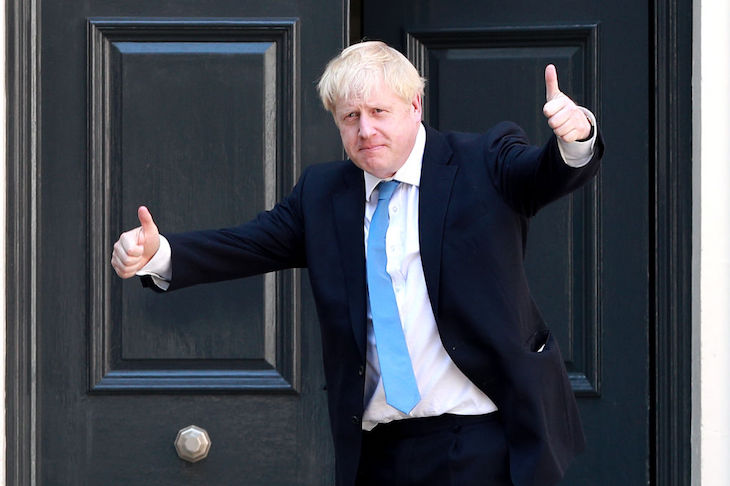Remember that mildly cringeworthy gag when Boris won the Tory leadership contest, and he promised to ‘Deliver Brexit, Unite the Country and Defeat Jeremy Corbyn’? He joked that Defeat, Unite and Deliver made the rather unfortunate acronym of ‘dud’. Throw in ‘energise’, and he claimed that he would be the ‘dude’ to save the UK from its Brexistential crisis.
Dad jokes aside, Boris now needs to take a NAP if he’s serious about Brexit. He is making the biggest blunder of his political career by dismissing Nigel Farage’s offer of a Non-Aggression Pact with the Brexit party.
The only way now to deliver on the 2016 referendum result is to have a major clear-out of the democracy-denying Brexit blockers currently occupying the Commons’ green benches. But if the maths in Parliament has been tricky for the Conservative party recently, the maths in the polls are a nightmare. They suggest the Prime Minister has no clear path towards a workable majority in the House of Commons.
The Tories under Boris, despite what may have felt like a rapturous honeymoon period, sit at best at around 32 per cent in the polls, with Labour on around 24 per cent, and the Lib Dems at 18 per cent. Before Boris became PM, the Brexit party was on an average of 20 per cent. Almost half of those who backed the Tories in 2017 had shuffled over to Farage in the preceding vacuum. Since Boris became prime minister half of those who defected to the Brexit party have subsequently returned to the Conservatives. The Brexit party now averages around 14 per cent.
But the Conservatives would be wrong to kick back and put their feet up. As Theresa May found out to her peril, all it takes is a single campaign cock-up or a misguided electoral message to completely derail an election campaign. And two years ago, Theresa May did not have Nigel Farage to contend with, after he took a step back from frontline politics causing Ukip’s influence to wane. Downing Street would be wrong as well to recklessly dismiss the Brexit party’s strong showing in the European Elections, especially when any general election to unpick the political deadlock in Westminster will be a proxy EU referendum campaign.
Ironically, Dominic Cummings’ failure to bring Farage into the Vote Leave camp in 2016 actually helped to broaden the support for Brexit. The two parallel campaigns on the Leave side during the referendum, openly at war with each other, offered anti-Tory Leavers a political home in Farage and Leave.EU, and polite dinner-party Leavers – who wouldn’t be seen dead in the Dog and Duck having a pint with Farage – a refuge in Vote Leave. The two super-charged campaigns, tapping into very different parts of the electorate, meant the Brexiteers defeated the monotone messaging of the status quo Remain campaign.
Only a handful of political observers, such as the likes of Matthew Goodwin, realised what was going on outside the Westminster bubble and the M25. In 2015, Ukip under Farage shocked the mainstream commentariat by tearing directly into Labour’s working-class heartlands. Parts of Wales, the Midlands, the English coast and the North suddenly turned a shade of purple. Those are parts of the electorate that the Conservatives simply cannot touch. These voters wouldn’t even back God if he wore a Tory rosette.
In the 2017 general election the Tories, buoyed by six solid months of strong polling, thought they finally carried the keys to unlock these Labour heartlands. In the end, they only came away with half a dozen Leave backing Labour seats.
CCHQ seems to think that any sort of alliance with Farage would deter polite, lifelong Tories from backing the party. But all of us share the goal of keeping Jeremy Corbyn and his wacky left-wing ideas well away from Downing Street. In an electoral pact, the Conservatives would allow the Brexit party to stand unimpeded in Labour seats where Ukip finished second in 2015 and where the Conservative party has little chance of causing an upset. In return, the Brexit party will commit to not splitting the Leave vote in the bluer heartlands of the South West, where the Lib Dems are the main challengers.
Of course, this comes with a clear condition. As the cattle prod to Boris’s Brexit strategy, Farage has made it absolutely clear that resurrecting the disastrous Withdrawal Agreement, which Brexiteers rightly regard as a surrender treaty to the EU – and that Boris himself has called ‘vassalage’ – simply would not cut it. If Boris guns for Brino (Brexit in name only), the Brexit party would run against the Tories in every seat. Even his own.
That is why it comes as a surprise to hear the PM’s spokesman dismiss the idea out of hand. What a shocking sense of entitlement to power. Fortunately, some Tories see sense. The so-called ‘Spartans’ of the European Research Group, such as Steve Baker, have argued that a deal should be done. They realise the nation’s future is at stake in an extremely febrile and unique political climate. It is a barely concealed secret that a number of them hold tactical discussions with their Brexit party cousins in WhatsApp groups. While certain big Brexit donors are also prepared to fund the Brexit party rather than the Conservatives if Boris veers off course. They don’t give their money to keep Brand Tory afloat, they part with cash to deliver results, and the result they want is a clean break Brexit, not a Westminster fake news fudge.
A vast majority of voters today identify primarily with being either a Leaver or a Remainer, even more than their allegiance to old political tribes. These are exceptional times. The Brexit party isn’t asking for a merger. We say it is in our interest to work together to ensure those 17.4 million Leave voters are not cheated out of Brexit. If Boris wants to stay in Number 10 and deliver Brexit ‘do or die’ his strategy should be clear – he simply has to sign a non-aggression pact.
Alexandra Phillips is a Brexit party MEP.






Comments